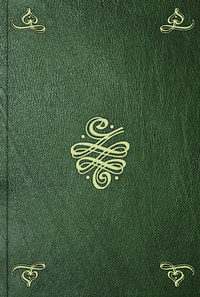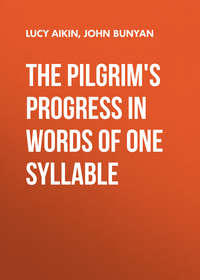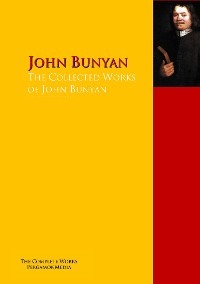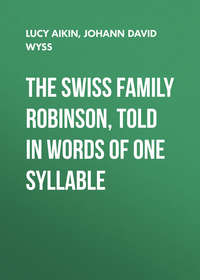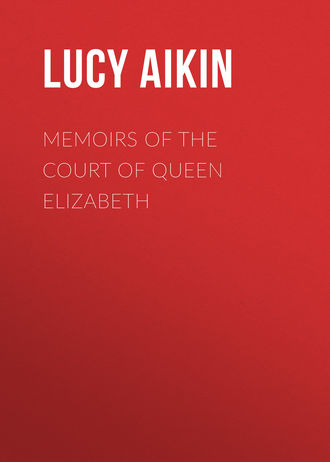 полная версия
полная версияMemoirs of the Court of Queen Elizabeth
But Henry, whose passions and interests alone, not his theological convictions, had set him in opposition to the old church establishment, to the ceremonies and doctrines of which he was even zealously attached, began to be apprehensive that the whole fabric would be swept away by the strong tide of popular opinion which was now turned against it, and he hastened to interpose in its defence. He brought to the stake several persons who denied the real presence, as a terror to the reformers; whilst at the same time he showed his resolution to quell the adherents of popery, by causing bishop Fisher and sir Thomas More to be attainted of treason, for refusing such part of the oath of succession as implied the invalidity of the king's first marriage, and thus, in effect, disallowed the authority of the papal dispensation in virtue of which it had been celebrated.
Thus were opened those dismal scenes of religious persecution and political cruelty from which the mind of Elizabeth was to receive its early and indelible impressions.
The year 1536, which proved even more fertile than its predecessor in melancholy incidents and tragical catastrophes, opened with the death of Catherine of Arragon; an event equally welcome, in all probability, both to the sufferer herself, whom tedious years of trouble and mortification must have rendered weary of a world which had no longer a hope to flatter her; and to the ungenerous woman who still beheld her, discarded as she was, with the sentiments of an enemy and a rival. It is impossible to contemplate the life and character of this royal lady, without feelings of the deepest commiseration. As a wife, the bitter humiliations which she was doomed to undergo were entirely unmerited; for not only was her modesty unquestioned, but her whole conduct towards the king was a perfect model of conjugal love and duty. As a queen and a mother, her firmness, her dignity, and her tenderness, deserved a far other recompense than to see herself degraded, on the infamous plea of incest, from the rank of royalty, and her daughter, so long heiress to the English throne, branded with illegitimacy, and cast out alike from the inheritance and the affections of her father. But the memory of this unhappy princess has been embalmed by the genius of Shakespeare, in the noble drama of which he has made her the touching and majestic heroine; and let not the praise of magnanimity be denied to the daughter of Anne Boleyn, in permitting those wrongs and those sufferings which were the price of her glory, nay of her very existence, to be thus impressively offered to the compassion of her people.
Henry was moved to tears on reading the tender and pious letter addressed to him by the dying hand of Catherine; and he marked by several small but expressive acts, the respect, or rather the compunction, with which the recollection of her could not fail to inspire him. Anne Boleyn paid to the memory of the princess-dowager of Wales—such was the title now given to Catherine—the unmeaning compliment of putting on yellow mourning; the color assigned to queens by the fashion of France: but neither humanity nor discretion restrained her from open demonstrations of the satisfaction afforded her by the melancholy event.
Short was her unfeeling triumph. She brought into the world a few days afterwards, a dead son; and this second disappointment of his hopes completed that disgust to his queen which satiety, and perhaps also a growing passion for another object, was already beginning to produce in the mind of the king.
It is traditionally related, that at Jane Seymour's first coming to court, the queen, espying a jewel hung round her neck, wished to look at it; and struck with the young lady's reluctance to submit it to her inspection, snatched it from her with violence, when she found it to contain the king's picture, presented by himself to the wearer. From this day she dated her own decline in the affections of her husband, and the ascendancy of her rival. However this might be, it is certain that the king about this time began to regard the conduct of his once idolized Anne Boleyn with an altered eye. That easy gaiety of manner which he had once remarked with delight, as an indication of the innocence of her heart and the artlessness of her disposition, was now beheld by him as a culpable levity which offended his pride and alarmed his jealousy. His impetuous temper, with which "once to suspect was once to be resolved," disdained to investigate proofs or to fathom motives; a pretext alone was wanting to his rising fury, and this he was not long in finding.
On May-day, then observed at court as a high festival, solemn justs were held at Greenwich, before the king and queen, in which viscount Rochford, the queen's brother, was chief challenger, and Henry Norris principal defender. In the midst of the entertainment, the king suddenly rose and quitted the place in anger; but on what particular provocation is not certainly known. Saunders the Jesuit, the great calumniator of Anne Boleyn, says that it was on seeing his consort drop her handkerchief, which Norris picked up and wiped his face with. The queen immediately retired, and the next day was committed to custody. Her earnest entreaties to be permitted to see the king were disregarded, and she was sent to the Tower on a charge of treason and adultery.
Lord Rochford, Norris, one Smeton a musician, and Brereton and another gentleman of the bed-chamber, were likewise apprehended, and brought to trial on the accusation of criminal intercourse with the queen. They were all convicted; but from the few particulars which have come down to us, it seems to be justly inferred, that the evidence produced against some at least of these unhappy gentlemen, was slight and inconclusive. Lord Rochford is universally believed to have fallen a victim to the atrocious perjuries of his wife, who was very improperly admitted as a witness against him, and whose infamous conduct was afterwards fully brought to light. No absolute criminality appears to have been proved against Weston and Brereton; but Smeton confessed the fact. Norris died much more generously: he protested that he would rather perish a thousand times than accuse an innocent person; that he believed the queen to be perfectly guiltless; he, at least, could accuse her of nothing; and in this declaration he persisted to the last. His expressions, if truly reported, seem to imply that he might have saved himself by criminating the queen: but besides the extreme improbability that the king would have shown or promised any mercy to such a delinquent, we know in fact that the confession of Smeton did not obtain for him even a reprieve: it is therefore absurd to represent Norris as having died in vindication of the honor of the queen; and the favor afterwards shown to his son by Elizabeth, had probably little connexion with any tenderness for the memory of her mother, a sentiment which she certainly exhibited in no other circumstance.
The trial and condemnation of the queen followed. The process was conducted with that open disregard of the first principles of justice and equity then universal in all cases of high treason: no counsel were assigned her, no witnesses confronted with her, and it does not appear that she was even informed of Smeton's confession: but whether, after all, she died innocent, is a problem which there now exist no means of solving, and which it is somewhat foreign from the purpose of this work to discuss.
One part of this subject, however, on account of the intimate relation which it bears to the history of Elizabeth, and the influence which it may be presumed to have exercised in the formation of her character, must be treated somewhat at large.
The common law of England, by an anomaly truly barbarous, denounced, against females only, who should be found guilty of high treason, the punishment of burning. By menaces of putting into execution this horrible sentence, instead of commuting it for decapitation, Anne Boleyn was induced to acknowledge some legal impediment to her marriage with the king; and on this confession alone, Cranmer, with his usual subserviency, gratified his royal master by pronouncing that union null and void, and its offspring illegitimate.
What this impediment, real or pretended, might be, we only learn from a public declaration made immediately afterwards by the earl of Northumberland, stating, that whereas it had been pretended, that a precontract had subsisted between himself and the late queen, he has declared upon oath before the lords of the council, and taken the sacrament upon it, that no such contract had ever passed between them. In explanation of this protest, the noble historian of Henry VIII.1 furnishes us with the following particulars. That the earl of Northumberland, when lord Percy, had made proposals of marriage to Anne Boleyn, which she had accepted, being yet a stranger to the passion of the king; that Henry, unable to bear the idea of losing her, but averse as yet to a declaration of his sentiments, employed Wolsey to dissuade the father of lord Percy from giving his consent to their union, in which he succeeded; the earl of Northumberland probably becoming aware how deeply the personal feelings of the king were concerned: that lord Percy, however, refused to give up the lady, alleging in the first instance that he had gone too far to recede with honor; but was afterwards compelled by his father to form another matrimonial connexion. It should appear by this statement, that some engagement had in fact subsisted between Northumberland and Anne; but there is no necessity for supposing it to have been a contract of that solemn nature which, according to the law as it then stood, would have rendered null the subsequent marriage of either party. The protestation of the earl was confirmed by the most solemn sanctions; which there is no ground for supposing him capable of violating, especially as on this occasion, so far from gaining any advantage by it, he was likely to give high offence to the king. If then, as appears most probable, the confession by which Anne Boleyn disinherited and illegitimatised her daughter was false; a perjury so wicked and cowardly must brand her memory with everlasting infamy:—even should the contrary have been the fact, the transaction does her little honor; in either case it affords ample justification to that daughter in leaving, as she did, her remains without a monument and her conduct without an apology.
The precarious and equivocal condition to which the little Elizabeth was reduced by the divorce and death of her mother, will be best illustrated by the following extracts of a letter addressed soon after the event, by lady Bryan her governess, to lord Cromwel. It may at the same time amuse the modern reader to remark the minute details on which, in that day, the first minister of state was expected to bestow his personal attention.
"…My lord, when your lordship was last here, it pleased you to say, that I should not mistrust the king's grace, nor your lordship. Which word was more comfort to me than I can write, as God knoweth. And now it boldeneth me to show you my poor mind. My lord, when my lady Mary's grace was born, it pleased the king's grace to [appoint] me lady mistress, and made me a baroness. And so I have been to the children his grace have had since.
"Now, so it is, my lady Elizabeth is put from that degree she was afore; and what degree she is at now, I know not but by hearsay. Therefore I know not how to order her, nor myself, nor none of hers that I have the rule of; that is, her women and her grooms. Beseeching you to be good lord to my lady and to all hers; and that she may have some rayment. For she hath neither gown, nor kirtle, nor petticoat, nor no manner of linen, nor foresmocks, nor kerchiefs, nor sleeves, nor rails, nor body-stitchets, nor mufflers, nor biggins. All these, her grace's mostake2, I have driven off as long as I can, that, by my troth, I cannot drive it no lenger. Beseeching you, my lord, that you will see that her grace may have that is needful for her, as my trust is ye will do—that I may know from you by writing how I shall order myself; and what is the king's grace's pleasure and yours, that I shall do in every thing.
"My lord, Mr. Shelton saith he is the master of this house: what fashion that shall be, I cannot tell; for I have not seen it before.—I trust your lordship will see the house honourably ordered, howsomever it hath been ordered aforetime.
"My lord, Mr. Shelton would have my lady Elizabeth to dine and sup every day at the board of estate. Alas! my lord, it is not meet for a child of her age to keep such rule yet. I promise you, my lord, I dare not take it upon me to keep her in health and she keep that rule. For there she shall see divers meats and fruits, and wine: which would be hard for me to restrain her grace from it. Ye know, my lord, there is no place of correction there. And she is yet too young to correct greatly. I know well, and she be there, I shall nother bring her up to the king's grace's honour, nor hers; nor to her health, nor my poor honesty. Wherefore I show your lordship this my desire. Beseeching you, my lord, that my lady may have a mess of meat to her own lodging, with a good dish or two, that is meet for her grace to eat of.
"God knoweth my lady hath great pain with her great teeth, and they come very slowly forth: and causeth me to suffer her grace to have her will, more than I would. I trust to God and her teeth were well graft, to have her grace after another fashion than she is yet: so as I trust the king's grace shall have great comfort in her grace. For she is as toward a child, and as gentle of conditions, as ever I knew any in my life. Jesu preserve her grace! As for a day or two at a hey time, or whensomever it shall please the king's grace to have her set abroad, I trust so to endeavour me, that she shall so do, as shall be to the king's honour and hers; and then after to take her ease again.
"Good my lord, have my lady's grace, and us that be her poor servants in your remembrance.
"From Hunsdon." (No date of time.)
On the day immediately following the death of the unfortunate Anne Boleyn, the king was publicly united in marriage to Jane Seymour; and an act of parliament soon after passed by which the lady Elizabeth was declared incapable of succeeding to the crown, which was now settled on the offspring of Henry by his present queen.
CHAPTER II
1536 TO 1542Vague notions of hereditary succession to the English throne.—Henry's jealousy of the royal family.—Imprisonment of lord T. Howard and lady M. Douglas.—After-fortunes of this lady.—Princess Mary reconciled with her father.—Dissolution of monasteries proceeds.—Insurrections in Lincolnshire and Yorkshire.—Remarkable trait of the power of the nobles.—Rebellion of T. Fitzgerald.—Romantic adventures of Gerald Fitzgerald.—Birth of prince Edward.—Death of the queen.—Rise of the two Seymours.—Henry's views in their advancement.—His enmity to cardinal Pole.—Causes of it.—Geffrey Pole discloses a plot.—Trial and death of lord Montacute, the marquis of Exeter, sir Edward Nevil, and sir N. Carew.—Particulars of these persons.—Attainder of the marchioness of Exeter and countess of Salisbury.—Application of these circumstances to the history of Elizabeth.—Decline of the protestant party.—Its causes.—Cromwel proposes the king's marriage with Anne of Cleves.—Accomplishments of this lady.—Royal marriage.—Cromwel made earl of Essex.—Anger of the Bourchier family.—Justs at Westminster.—The king determines to dissolve his marriage.—Permits the fall of Cromwel.—Is divorced.—Behaviour of the queen.—Marriage of the king to Catherine Howard.—Ascendency of the papists.—Execution of the countess of Salisbury—of lord Leonard Grey.—Discovery of the queen's ill-conduct.—Attainders passed against her and several others.
Nothing could be more opposite to the strict principles of hereditary succession than the ideas entertained, even by the first lawyers of the time of Henry VIII., concerning the manner in which a title to the crown was to be established and recognised.
When Rich, the king's solicitor, was sent by his master to argue with sir Thomas More on the lawfulness of acknowledging the royal supremacy; he inquired in the course of his argument, whether sir Thomas would not own for king any person whatever,—himself for example,—who should have been declared so by parliament? He answered, that he would. Rich then demanded, why he refused to acknowledge a head of the church so appointed? "Because," replied More, "a parliament can make a king and depose him, and that every parliament-man may give his consent thereunto, but a subject cannot be bound so in case of supremacy3." Bold as such doctrine respecting the power of parliaments would now be thought, it could not well be controverted at a time when examples were still recent of kings of the line of York or Lancaster alternately elevated or degraded by a vote of the two houses, and when the father of the reigning sovereign had occupied the throne in virtue of such a nomination more than by right of birth.
But the obvious inconveniences and dangers attending the exercise of this power of choice, had induced the parliaments of Henry VIII. to join with him in various acts for the regulation of the succession. It was probably with the concurrence of this body, that in 1532 he had declared his cousin, the marquis of Exeter, heir to the crown; yet this very act, by which the king excluded not only his daughter Mary, but his two sisters and their children, every one of whom had a prior right according to the rules at present received, must have caused the sovereignty to be regarded rather as elective in the royal family than properly hereditary—a fatal idea, which converted every member of that family possessed of wealth, talents, or popularity, into a formidable rival, if not to the sovereign on the throne, at least to his next heir, if a woman or a minor, and which may be regarded as the immediate occasion of those cruel proscriptions which stained with kindred blood the closing years of the reign of Henry, and have stamped upon him to all posterity the odious character of a tyrant.
The first sufferer by the suspicions of the king was lord Thomas Howard, half-brother to the duke of Norfolk, who was attainted of high treason in the parliament of 1536, for having secretly entered into a contract of marriage with lady Margaret Douglas, the king's niece, through which alliance he was accused of aiming at the crown. For this offence he was confined in the Tower till his death; but on what evidence of traitorous designs, or by what law, except the arbitrary mandate of the monarch confirmed by a subservient parliament, it would be difficult to say. That his marriage was forbidden by no law, is evident from the passing of an act immediately afterwards, making it penal to marry any female standing in the first degree of relationship to the king, without his knowledge and consent.
The lady Margaret was daughter to Henry's eldest sister, the queen-dowager of Scotland, by her second husband the earl of Angus. She was born in England, whither her mother had been compelled to fly for refuge by the turbulent state of her son's kingdom, and the ill success of her own and her husband's struggles for the acquisition of political power. In the English court the lady Margaret had likewise been educated, and had formed connexions of friendship; whilst her brother James V. laboured under the antipathy with which the English then regarded those northern neighbours, with whom they were involved in almost perpetual hostilities. It might easily therefore have happened, in case of the king's death without male heirs, that in spite of the power recently bestowed on him by parliament of disposing of the crown by will, which it is very uncertain how he would have employed, a connexion with the potent house of Howard might have given the title of lady Margaret a preference over that of any other competitor. Henry was struck with this danger, however distant and contingent: he caused his niece, as well as her spouse, to be imprisoned; and though he restored her to liberty in a few months, and the death of Howard, not long afterwards, set her free from this ill-starred engagement, she ventured not to form another, till the king himself, at the end of several years, gave her in marriage to the earl of Lenox; by whom she became the mother of lord Darnley, and through him the progenitrix of a line of princes destined to unite another crown to the ancient inheritance of the Plantagenets and the Tudors.
The princess Mary, after the removal of Anne Boleyn, who had exercised towards her the utmost insolence and harshness, ventured upon some overtures towards a reconciliation with her father; but he would accept them on no other conditions than her adopting his religious creed, acknowledging his supremacy, denying the authority of the pope, and confessing the unlawfulness of her mother's marriage. It was long before motives of expediency, and the persuasion of friends, could wring from Mary a reluctant assent to these cruel articles: her compliance was rewarded by the return of her father's affection, but not immediately by her reinstatement in the order of succession. She saw the child of Anne Boleyn still a distinguished object of the king's paternal tenderness; the new queen was likely to give another heir to the crown; and whatever hopes she, with the catholic party in general, had founded on the disgrace of his late spouse, became frustrated by succeeding events.
The death of Catherine of Arragon seemed to have removed the principal obstacles to an agreement between the king and the pope; and the holy father now deigned to make some advances towards a son whom he hoped to find disposed to penitence: but they were absolutely rejected by Henry, who had ceased to dread his spiritual thunders. The parliament and the convocation showed themselves prepared to adopt, without hesitation, the numerous changes suggested by the king in the ancient ritual; and Cromwel, with influence not apparently diminished by the fall of the late patroness of the protestant party, presided in the latter assembly with the title of vicegerent, and with powers unlimited.
The suppression of monasteries was now carried on with increasing rigor, and thousands of their unfortunate inhabitants were mercilessly turned out to beg or starve. These, dispersing themselves over the country, in which their former hospitalities had rendered them generally popular, worked strongly on the passions of the many, already discontented at the imposition of new taxes, which served to convince them that the king and his courtiers would be the only gainers by the plunder of the church; and formidable insurrections were in some counties the result. In Lincolnshire the commotions were speedily suppressed by the interposition of the earl of Shrewsbury and other loyal noblemen; but it was necessary to send into Yorkshire a considerable army under the duke of Norfolk. Through the dexterous management of this leader, who was judged to favor the cause of the revolters as much as his duty to his sovereign and a regard to his own safety would permit, little blood was shed in the field; but much flowed afterwards on the scaffold, where the lords Darcy and Hussey, sir Thomas Percy, brother to the earl of Northumberland, and several private gentlemen, suffered as traitors.
The suppression of these risings strengthened, as usual, the hands of government, but at the expense of converting into an object of dread, a monarch who in the earlier and brighter period of his reign had been regarded with sentiments of admiration and love.
In lord Herbert's narrative of this insurrection, we meet with a passage too remarkable to be omitted. "But the king, who was informed from divers parts, but chiefly from Yorkshire, that the people began there also to take arms, and knowing of what great consequence it might be if the great persons in those parts, though the rumour were false, should be said to join with him, had commanded George earl of Shrewsbury, Thomas Manners earl of Rutland, and George Hastings earl of Huntingdon, to make a proclamation to the Lincolnshire-men, summoning and commanding them on their allegiance and peril of their lives to return; which, as it much disheartened them, so many stole away," &c.
In this potency of the hereditary aristocracy of the country, and comparative feebleness, on some occasions at least, of the authority of the most despotic sovereign whom England had yet seen on the throne, we discern at once the excuse which Henry would make to himself for his severities against the nobility, and the motive of that extreme popularity of manners by which Elizabeth aimed at attaching to herself the affections of the middling and lower orders of her subjects.


